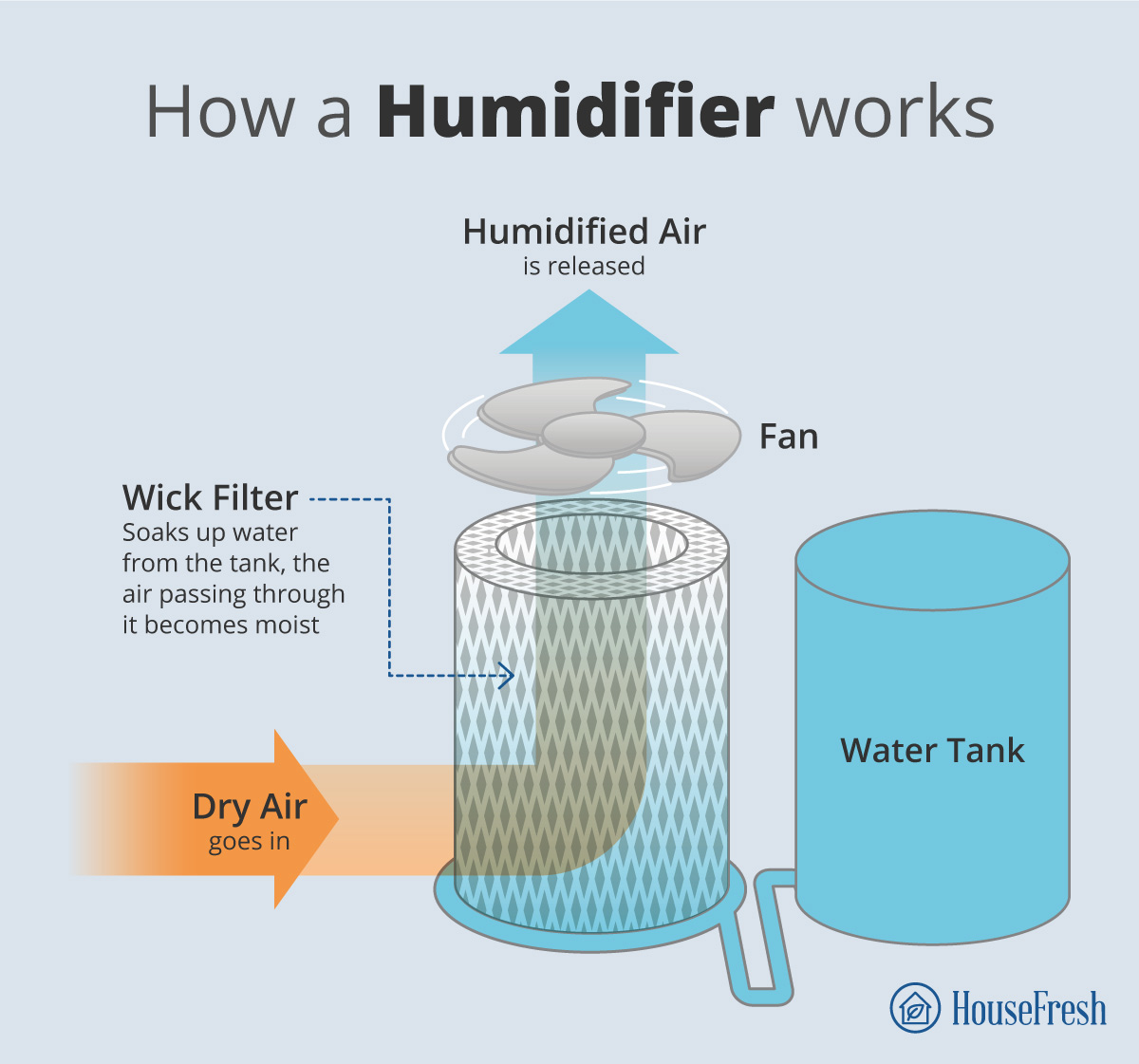Often, air purifiers and humidifiers are lumped together in the same category. It can be confusing which one you need for your home. Granted, they can both improve your indoor air quality, but that’s where the similarities end.
You’re probably asking yourself, “What’s the difference?” and maybe more importantly, “Which one do I need?”
In this post, I’ll take you through the key differences between air purifiers and humidifiers, what they do, how they do it, and which device would suit your situation best.
Key differences between air purifiers and humidifiers
Before we go any further, I want to address the major difference between an air purifier and a humidifier as simply as possible.
Air purifiers clean the air, humidifiers add moisture to the air.
It may sound simple, but what exactly does that mean? Let’s examine each product closely to establish the key differences.
1. Air purifiers clean the air in your home

According to the EPA, the average American spends around 90% of their time indoors, where the air is full of pollutants. If not removed, these pollutants can have adverse immediate and long-term effects on our health.
Air purifiers pull air into the unit using a fan, pass it through a series of filters, and then push the clean air out. The filters trap microscopic pollutant particles (allergens, odors, dust, VOCs, etc.), leaving you with clean air.

There are thousands of air purifiers on the market. Some great and some not. So, it’s worth doing a little research before choosing the right one for your home. Check out our guide: What size air purifier do I need? to help with your journey.
If my extremely simplified explanation hasn’t satisfied your curiosity, don’t worry.
Here at HouseFresh, we’re dedicated to providing informative yet easy-to-read articles to help you understand the science behind a healthy home environment.
If you want to delve into the world of air purifiers, check out our blog, where you’ll find:
2. Humidifiers add moisture to the air

Low humidity can be an issue in your home, especially in the winter months. It’s not only uncomfortable to live in, but it can cause dry skin, eye irritation, and also make it hard to breathe. Studies have shown that introducing a humidifier into your room can relieve respiratory symptoms, alleviate dry skin, and even decrease the survival of influenza viruses.
Humidifiers draw in air from your room, introducing it to moisture from a water tank through a wick or mixing it with steam. The wet air is then released into the environment, mixing in with your air.

There are three main types of humidifier:
- Evaporative humidifier – This unit has a reservoir that stores cold water and empties it into a basin. The water is absorbed from the water using a wicking filter. It then blasts air through the wet filter with the help of a fan.
- Ultrasonic humidifier – This type of humidifier generates water droplets using a metal diaphragm. This component vibrates at an ultrasonic frequency (similar to a high-frequency speaker). An ultrasonic humidifier is usually quiet to run and creates a cool fog.
- Vaporizer humidifier – AKA a vaporizer, heats water and distributes it into the room as warm steam. This is the most basic and least expensive way of introducing moisture to the air.
I’ve gone and done it again. Given the bare bones of what a humidifier is and how it works.
This is where the HouseFresh team comes into play with a host of articles to guide you:
When to choose an air purifier over a humidifier
Air purifiers can be costly investments, so understanding when to buy one over a humidifier will save you a lot of frustration and money.
✔️ What an air purifier can help with
❌ What an air purifier won’t do
When to choose a humidifier over an air purifier
Humidifiers can be a great addition to your room, allowing you to maintain a healthy humidity in the air. But, there are some things a humidifier cannot do.
✔️ What a humidifier can help with
❌ What a humidifier won’t do
To conclude
Even though they look similar and deal with air quality, air purifiers and humidifiers have very different roles in your household. Remember the golden rule: air purifiers clean the air, humidifiers add moisture.
The good thing is you can run both in the same room simultaneously. You can have clean and moist air as they perform different tasks.
There is a third alternative. Brands have started combining air purifiers and humidifiers in the same unit. But I always air on the side of caution when I see combo units. If a device tries to do two jobs, it probably doesn’t do either to an acceptable standard.
Check out our review of the Dyson PH03 Air Purifier and Humidifier to see Danny’s verdict on one of the best-selling purifier/humidifier combos on the market.
SOURCES
- American Academy of Allergy, Asthma, and Immunology. (2024). Pet Allergy. aaaai.org
- Asthma Canada.(2024). Humidifiers and Vaporizers. asthma.ca
- Cox, J. et al. (2018). Effectiveness of a Portable Air Cleaner in Removing Aerosol Particles in Homes Close to Highways. ncbi.nlm.nih.gov
- Rosenberg, Dr R. (2021). Protect Your Health and Sleep Better with a Humidifier. sleephealthsolutionsohio.com
- Schoos, A.et al. (2018). Component-resolved diagnostics in pet allergy: Current perspectives and future directions. pubmed.ncbi.nlm.nih.gov
- Sahai, D. (2017). Humidifier use in health care. publichealthontario.ca
- Stukus, D. (2018). Humidifiers for Respiratory Infections: Are They Helpful or Harmful?. nationwidechildrens.org
- United States Environmental Protection Agency. (2024). Improving Your Indoor Environment. epa.gov
- United States Environmental Protection Agency. (2024). Introduction to Indoor Air Quality. epa.gov
- United States Environmental Protection Agency. (2024). Air Cleaners and Air Filters in the Home. epa.gov
- Willis, K. (2020). Using tap water in an ultrasonic humidifier may be polluting your air, study shows. ualberta.ca





